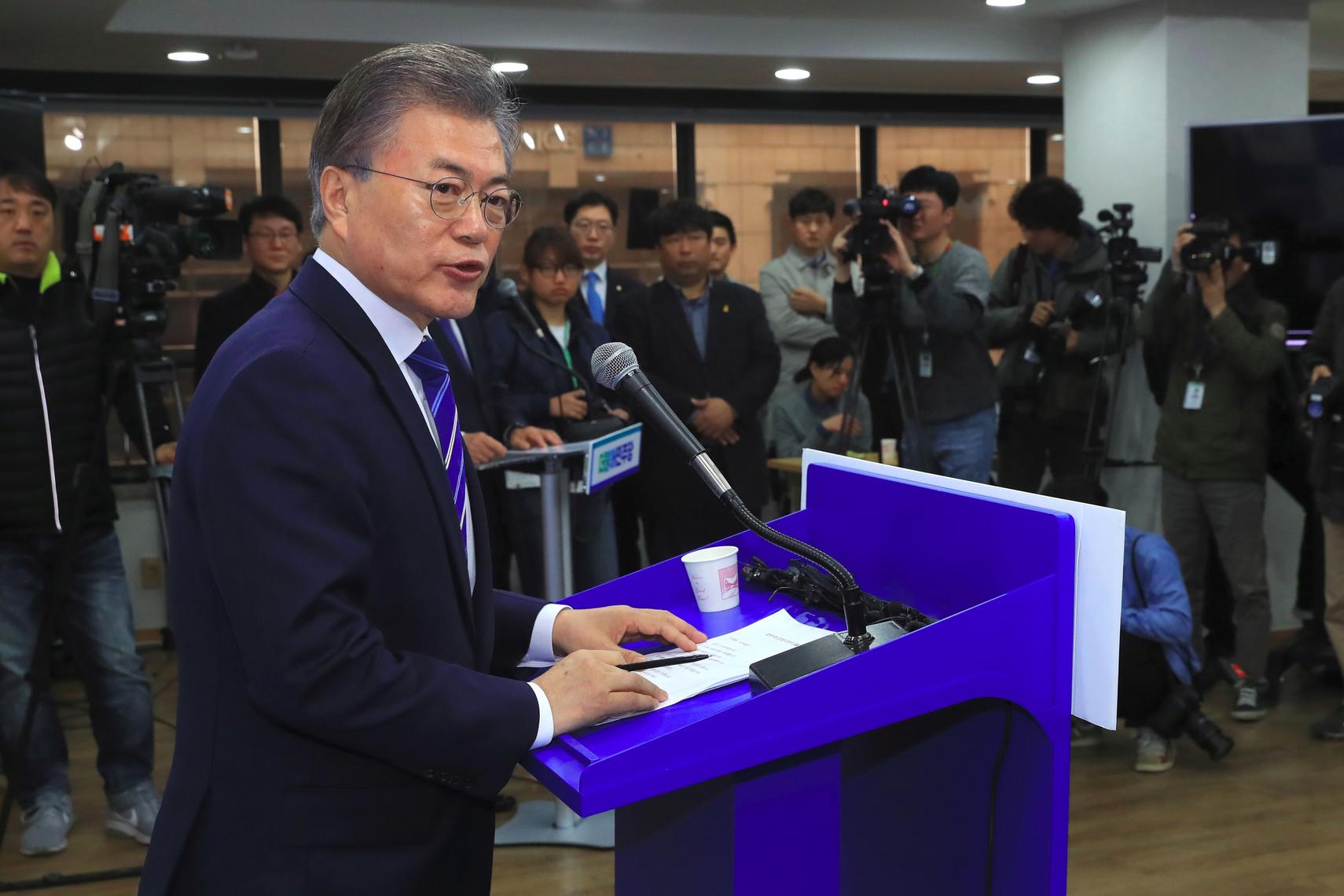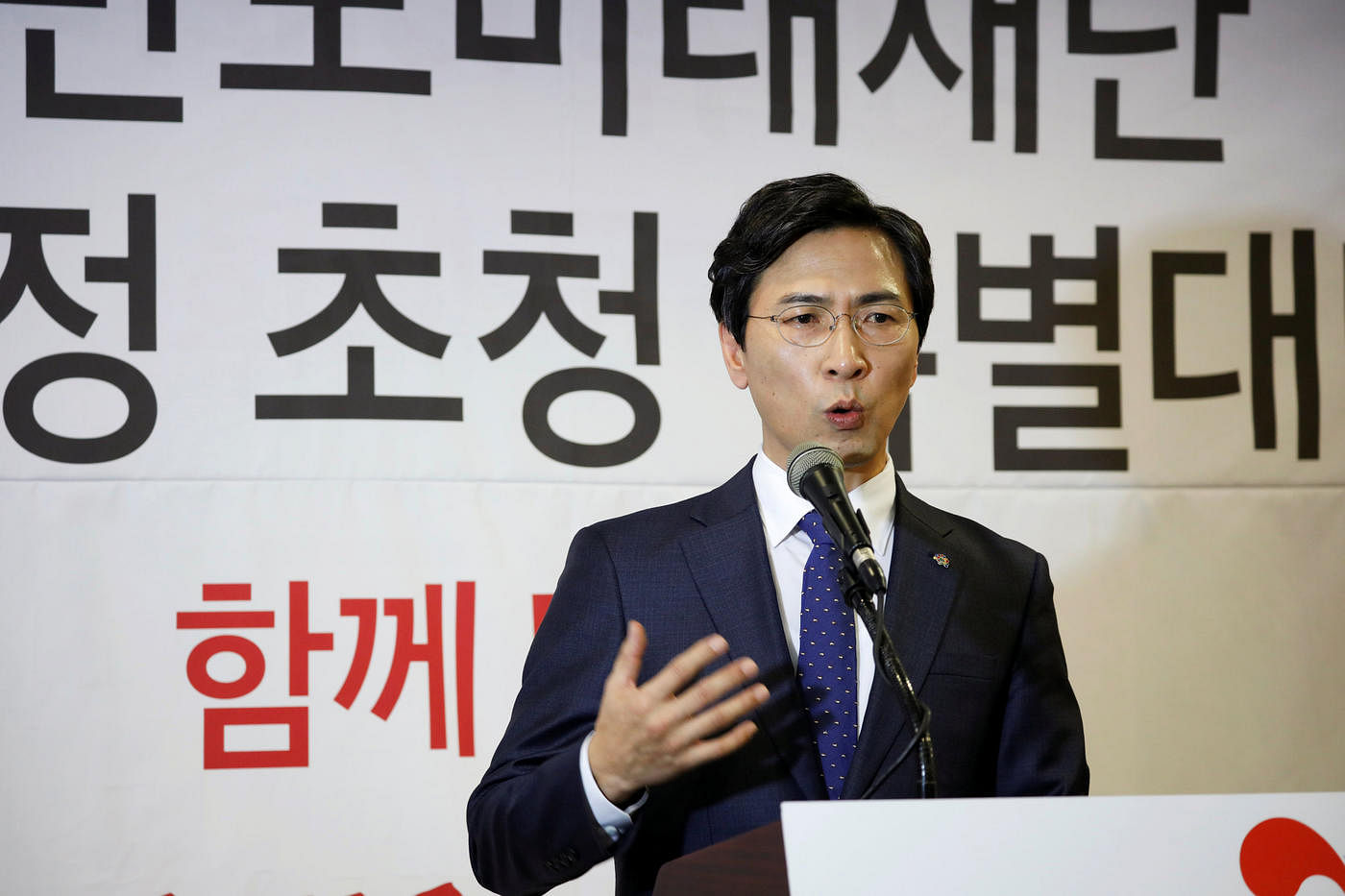SEOUL - The competition to lead South Korea - Asia's fourth-largest economy - got off the mark last Friday (March 10) after the Constitutional Court dismissed Park Geun Hye from office over an influence-peddling scandal.
Her replacement, who will have to win an election to be held within 60 days, will face a host of problems including economic woes, North Korea's nuclear threat and Chinese retaliation over Seoul's deployment of a US missile defence system.
Here's a quick look at the candidates and their policy positions, as well as the key challenges for the next president:
LEADING CANDIDATES AND KEY POLICIES
Moon Jae In, 64

The former lawmaker and ex-leader of the main opposition Democratic Party lost to Park in the 2012 election by 3 percentage points. He has been at the top of polls in the race to replace her.
He favours closer engagement with North Korea. He has also called for the next government to review a decision to deploy the US-made Terminal High Altitude Area Defence (Thaad) system, which has prompted China to squeeze South Korean companies on the mainland and clamp down on tourism to the country.
Moon has also pledged to get tougher on South Korea's conglomerates, saying they need reform.
An Hee Jung, 51

The youthful-looking provincial governor surged to second place in opinion polls after former UN chief Ban Ki Moon dropped out of the race.
An was an aide to former President Roh Moo Hyun when Moon was Roh's chief of staff. He is a two-term governor of rural South Chungcheong province. Some supporters have nicknamed him the "Obama of South Korea" because of his casual attire and communication skills.
An favours more engagement with North Korea but has said the Thaad deal should be respected as South Korea and the United States have agreed to deploy it. He has also called for a fair, transparent market economy.
Ahn Cheol Soo, 55
The member of parliament is a former doctor and computer businessman. His popularity has waned in recent months after stepping down as co-chair of the new opposition People's Party, after it became embroiled in a kickback scandal over advertising funds. He was not implicated.
Ahn is open to dialogue on North Korea, though he has also advocated a tough line. He has said the Thaad system must be deployed and South Korea must make greater efforts to convince China that the system is not aimed at them.
On the economy, he advocates the expansion of small- and medium-sized enterprises.
Hwang Kyo Ahn, 59

The prime minister became acting president after parliament voted to impeach Park on Dec 9. Hwang was a state prosecutor for nearly 30 years before launching a career in politics and is considered a loyalist in Park's cabinet. He has not said if he will run for president but has, nevertheless, emerged as a top conservative candidate.
Hwang reflects Park's tough line on North Korea and whole-hearted support for Thaad system. His economic thinking is conservative.
Lee Jae Myeong , 52
The mayor of Seongnam, a city south-east of Seoul, has surged in opinion polls as an outspoken critic of Park since the scandal that led to her impeachment erupted.
A member of the main opposition Democratic Party, Lee has said he wants to be the South Korean version of Bernie Sanders, the US Democratic Party insurgent who ran against Hillary Clinton during the US presidential election.
He has billed himself as the inheritor of the "Sunshine policy" of engaging North Korea. He recently told Chinese media that the Thaad deployment should be called off. He is well known for his staunch criticism of the chaebol, or conglomerate.
KEY CHALLENGES
Growing threat from North Korea
North Korea conducted two nuclear tests last year, as well as numerous missile launches, the latest on March 6 when it fired four ballistic missiles into the sea off Japan. The secretive state is reportedly building and testing an intercontinental ballistic missile (ICBM) with a solid fuel motor that could be carried by a small, easily-hidden road convoy.
Long-time observers say the risk of conflict is higher than it has been in years, and likely to rise further as North Korean leader Kim Jong Un seeks to fulfill his pledge to field long-range missiles capable of striking US cities.
Chinese retaliation over Thaad system
South Korean firms have had a torrid time in China since Seoul dismissed Chinese objections and approved the deployment of the Thaad missile defence system. Lotte Group, for example, has seen some of its stores in China fined or closed by authorities. Korean airlines have been refused permission to increase China-Korea flights, cosmetics firms have reported increased scrutiny at customs, and Chinese travel agents have been ordered to stop tours to South Korea.
South Korea sold US$124 billion (S$176 billion) worth of goods and services to China last year, about five times the amount exported to its eastern neighbour Japan, and double that shipped to its second-biggest market, the United States. But the amount could drop this year after China's state media orchestrated a boycott on Korean produce.
Economic woes
Longstanding economic challenges are also becoming more difficult. At a time of slowing trade and rising protectionism, South Korea remains dangerously reliant on exports, which account for nearly half of its gross domestic product.
China's retaliation over the Thaad system and protectionist policies from US President Donald Trump's administration top the list of imminent threats to growth for South Korea. The Bank of Korea sees the economy expanding 2.5 per cent this year, the slowest pace since 2012. But growth could slow further.
Household debt has also soared to more than US$1 trillion, and there are fears of a housing bubble.
Close ties between government and conglomerates
Park's downfall has spurred efforts to dismantle the cozy ties between the government and family-run conglomerates called chaebol - such as Samsung Group - that have dominated the country for decades. The top 10 chaebol own more than 27 per cent of all business assets in South Korea.
The legislature has begun to debate serious reforms to reduce the conglomerates' stranglehold on the Korean economy. These should be passed quickly, along with measures to support small and medium-sized businesses, which have traditionally struggled for access to capital and talent.
SOURCES: REUTERS, BLOOMBERG, AGENCE FRANCE-PRESSE

